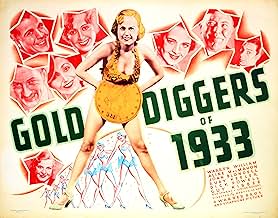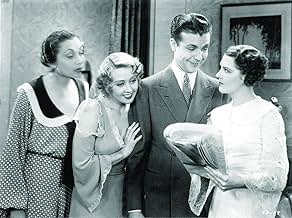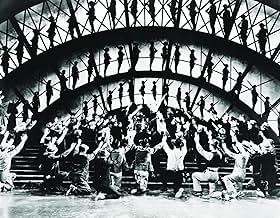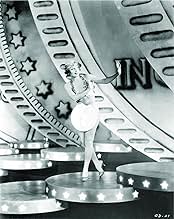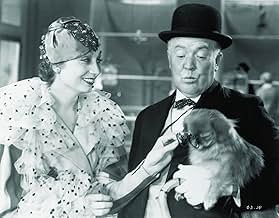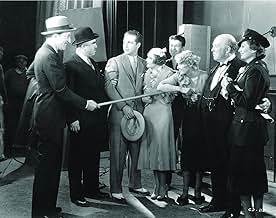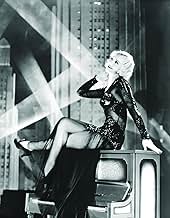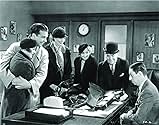IMDb RATING
7.7/10
9.6K
YOUR RATING
A wealthy composer rescues unemployed Broadway performers with a new play, but insists on remaining anonymous.A wealthy composer rescues unemployed Broadway performers with a new play, but insists on remaining anonymous.A wealthy composer rescues unemployed Broadway performers with a new play, but insists on remaining anonymous.
- Nominated for 1 Oscar
- 4 wins & 1 nomination total
Robert Agnew
- Dance Director
- (uncredited)
Loretta Andrews
- Gold Digger
- (uncredited)
Monica Bannister
- Gold Digger
- (uncredited)
Bonnie Bannon
- Gold Digger
- (uncredited)
Joan Barclay
- Gold Digger
- (uncredited)
Anita Barnes
- Gold Digger
- (uncredited)
Billy Barty
- Baby in 'Pettin' in the Park' Number
- (uncredited)
Busby Berkeley
- Call Boy
- (uncredited)
Bonnie Blackwood
- Chorus girl
- (uncredited)
Eric Blore
- Clubman
- (uncredited)
Featured reviews
With the success of "42nd Street," Warner Brothers wasted no time adding Busby Berkeley musical numbers to "Gold Diggers of 1933."
Starring Dick Powell and Ruby Keeler, this musical also has some of the same Depression darkness that permeated "42nd Street." "It's the Depression, dearie," Ginger Rogers says as the show she and her fellow chorines are laboring in closes in rehearsal due to lack of funding.
However, Brad (Powell), a composer in a nearby apartment who's sweet on Polly (Keeler), offers to give Ned Sparks the money he needs to produce his new show. His only condition is that Polly be featured.
Everyone wonders where he got the money, and a news item plus the fact that he refuses to appear in the show make the girls suspicious that he's a bank robber. In fact, he's the scion of a wealthy man (Warren William), who soon appears on the scene with his attorney (Guy Kibbee) when Brad steps in for the lumbago-ridden juvenile lead.
Polly's roommates Trixie and Carol (Joan Blondell and Aline MacMahon) go to work on the two immediately.
Though the film has some fantastic numbers - "We're in the Money," "The Shadow Waltz," "Pettin' in the Park," and great Busby Berkeley choreography, the middle section has no music and drags on as the gals meet the men, get them to pay for expensive hats, etc. This is probably because the film was completed when the musical numbers were added.
But the final number is worth the whole film. "Remember Your Forgotten Man" is a tribute to the World War I soldiers now out of work in the Depression, and not only are the production effects and choreography fantastic, but the singing as well, particularly the solo work by Etta Morton. Blondell, who from the sound of it in Dames was completely tone deaf, is beautifully dubbed here.
Ginger Rogers shines in a supporting role especially with her pig Latin lyrics to "We're in the Money" which were added after she was heard fooling around in a rehearsal. Powell is in gorgeous voice in all the numbers, but "I've Got to Sing a Torch Song" is a high point.
It's easy to watch the dancing, the beautiful women in their costumes, and listen to the singing and forget what in fact was going on in the '30s - after all, that's why these films were made.
But the "Forgotten Man" number serves as a reminder then and today that for the people sitting in the theaters, their troubles were right outside the door.
Starring Dick Powell and Ruby Keeler, this musical also has some of the same Depression darkness that permeated "42nd Street." "It's the Depression, dearie," Ginger Rogers says as the show she and her fellow chorines are laboring in closes in rehearsal due to lack of funding.
However, Brad (Powell), a composer in a nearby apartment who's sweet on Polly (Keeler), offers to give Ned Sparks the money he needs to produce his new show. His only condition is that Polly be featured.
Everyone wonders where he got the money, and a news item plus the fact that he refuses to appear in the show make the girls suspicious that he's a bank robber. In fact, he's the scion of a wealthy man (Warren William), who soon appears on the scene with his attorney (Guy Kibbee) when Brad steps in for the lumbago-ridden juvenile lead.
Polly's roommates Trixie and Carol (Joan Blondell and Aline MacMahon) go to work on the two immediately.
Though the film has some fantastic numbers - "We're in the Money," "The Shadow Waltz," "Pettin' in the Park," and great Busby Berkeley choreography, the middle section has no music and drags on as the gals meet the men, get them to pay for expensive hats, etc. This is probably because the film was completed when the musical numbers were added.
But the final number is worth the whole film. "Remember Your Forgotten Man" is a tribute to the World War I soldiers now out of work in the Depression, and not only are the production effects and choreography fantastic, but the singing as well, particularly the solo work by Etta Morton. Blondell, who from the sound of it in Dames was completely tone deaf, is beautifully dubbed here.
Ginger Rogers shines in a supporting role especially with her pig Latin lyrics to "We're in the Money" which were added after she was heard fooling around in a rehearsal. Powell is in gorgeous voice in all the numbers, but "I've Got to Sing a Torch Song" is a high point.
It's easy to watch the dancing, the beautiful women in their costumes, and listen to the singing and forget what in fact was going on in the '30s - after all, that's why these films were made.
But the "Forgotten Man" number serves as a reminder then and today that for the people sitting in the theaters, their troubles were right outside the door.
This masterpiece from 1933 is one of the best examples I've seen of early Hollywood exploitation, although by today's standards if you didn't already know it was controversial at the time you probably wouldn't notice. With the introduction of the talkies in the late 1920's, Hollywood seemed unable to control various movies using subtle innuendos, and actresses displaying a bit more skin than they should until the Hays Code came into full force in 1934, which enforced the boundaries as to what was deemed acceptable on screen. Gangsters profited from crime, women displayed their legs, and in the case of Gold Diggers Of 1933, women used their sexuality to conquer men and gain what they wanted.
Set during the Depression, it follows a quartet of stage dancers after their show is stopped due to the creative director failing to pay the bills. Things look on the up when the girls are asked to return for a brand new show, which would tackle the effects of the Depression on the common man and the state of the country. The enthusiastic director Barney (Ned Sparks) overhears the girls' neighbour Brad (Dick Powell) crooning a tune playing his piano, and invites him to play more tunes and eventually write the score for the upcoming musical. Barney also needs a lot of money to fund, something that Brad is happy to pay in case, much to the girls' suspicion.
It comes across as a film with two halves - the first focusing on the development of the musical, the relationship between Brad and dancer Polly (Ruby Keeler), and the confusion surrounding the shady Brad's situation. The second seeing fellow dancers Carol (Joan Blondell) and Trixie's (Aline MacMahon) attempts to squeeze as much cash as possible out of Barney's upper-class brother Lawrence (a brilliant Warren William) and bumbling Peabody (Guy Kibbee). The first is a masterclass of beautiful stage numbers, fantastic songs, and good old-fashioned escapism. The second is where the film hits full stride, providing laugh out loud situations and some verbal comedy that wouldn't look out place today, as the girls flirt with and tease the old men as we cheer them on. It's the kind of thing that Sex And The City wishes it could pull off when it isn't being so materialistic and soulless.
When you think it's over it pulls off one last masterstroke in the highly effective 'Remember My Forgotten Man' musical number, as Joan Blondell sings about how her man fought for her country and now begs for food and resorts to picking up discarded cigarette butts, as bloody soldiers march through the street. It's a beautiful moment and really sums up the era. It offers an insight into the whole Pre-Code Hollywood movement, where people would go to the cinema to escape their everyday struggles to see an actress like Blondell revealing a bit more leg than she should, or a Pre-Code veteran such as Warren William sneer his way through some juicy lines and villainous roles. It gave the general public that little something extra to get excited about.
This is a film that has everything, and if you can track it down I would urge you to see it. It's a fascinating time capsule, and even has a very early role for Ginger Rogers as the flirty Fay. It has also been entered into the National Film Registry for preservation by the Library of Congress. A must-see.
www.the-wrath-of-blog.blogspot.com
Set during the Depression, it follows a quartet of stage dancers after their show is stopped due to the creative director failing to pay the bills. Things look on the up when the girls are asked to return for a brand new show, which would tackle the effects of the Depression on the common man and the state of the country. The enthusiastic director Barney (Ned Sparks) overhears the girls' neighbour Brad (Dick Powell) crooning a tune playing his piano, and invites him to play more tunes and eventually write the score for the upcoming musical. Barney also needs a lot of money to fund, something that Brad is happy to pay in case, much to the girls' suspicion.
It comes across as a film with two halves - the first focusing on the development of the musical, the relationship between Brad and dancer Polly (Ruby Keeler), and the confusion surrounding the shady Brad's situation. The second seeing fellow dancers Carol (Joan Blondell) and Trixie's (Aline MacMahon) attempts to squeeze as much cash as possible out of Barney's upper-class brother Lawrence (a brilliant Warren William) and bumbling Peabody (Guy Kibbee). The first is a masterclass of beautiful stage numbers, fantastic songs, and good old-fashioned escapism. The second is where the film hits full stride, providing laugh out loud situations and some verbal comedy that wouldn't look out place today, as the girls flirt with and tease the old men as we cheer them on. It's the kind of thing that Sex And The City wishes it could pull off when it isn't being so materialistic and soulless.
When you think it's over it pulls off one last masterstroke in the highly effective 'Remember My Forgotten Man' musical number, as Joan Blondell sings about how her man fought for her country and now begs for food and resorts to picking up discarded cigarette butts, as bloody soldiers march through the street. It's a beautiful moment and really sums up the era. It offers an insight into the whole Pre-Code Hollywood movement, where people would go to the cinema to escape their everyday struggles to see an actress like Blondell revealing a bit more leg than she should, or a Pre-Code veteran such as Warren William sneer his way through some juicy lines and villainous roles. It gave the general public that little something extra to get excited about.
This is a film that has everything, and if you can track it down I would urge you to see it. It's a fascinating time capsule, and even has a very early role for Ginger Rogers as the flirty Fay. It has also been entered into the National Film Registry for preservation by the Library of Congress. A must-see.
www.the-wrath-of-blog.blogspot.com
with 42nd Street and Footlight Parade... Snappy, risqué, funny, great cast, great music. What more could you ask for? Joan Blondell, Aline McMahon, and Ruby Keeler are the gold diggers. Warren William, Dick Powell, and Guy Kibbee are their targets. Ginger Rogers is swell singing "We're in the Money" in Pig Latin. Ned Sparks, Sterling Holloway, Charles Lane, and Billy Barty are good. Great musical numbers including the opening "We're in the Money," the terrific finale "Forgotten Man" with Blondell and Etta Moten (singing in the window); "Petting in the Park" and "In a Shadow"---Powell and Keeler.... all classics. Fun all the way......
Look for Hobart Cavanaugh, Grace Hayle, Busby Berkley, Clarence Nordstrom, and one of the roller skating cops sure looks like Jack Carson.
Aline McMahon steals the show, and what a show it is!
Look for Hobart Cavanaugh, Grace Hayle, Busby Berkley, Clarence Nordstrom, and one of the roller skating cops sure looks like Jack Carson.
Aline McMahon steals the show, and what a show it is!
Made in the year when the global economic crash hit rock bottom, and the first signs of recovery began to appear, 'Gold Diggers' is very much a product of the Depression. Bread lines and penury are all around, but there is a jaunty air of optimism, too: "the long-lost dollar has come back to the fold".
Polly, Trixie and Carol are three vivacious and attractive showgirls who room together and scrape a precarious living by getting hired for each new Broadway musical as it crops up, and riding their luck until it closes - which is often before it even opens. On the fringe of their group hovers Fay, the smart blonde with the waspish tongue (Ginger Rogers).
The girls are 'gold diggers' in that they waste no opportunity to batten onto rich men. It is hinted during the course of the film that showgirls inhabit a shadowy region on the borders of prostitution, and the harsh economic realities of 1933 force the girls to regard their good looks as a marketable commodity.
A kind of innocent carnality runs through the film. Our three heroines actually sleep together. Fay thinks nothing of changing clothes with Carol, and she gets her backside slapped several times - by both men AND women. Trixie bathes with the door wide open, while Carol preens herself in the scantiest of negligees. The girls contrive to embarrass a rich snob by having him wake up undressed in Carol's bed. The script is loaded with playful smuttiness - taking 'Back Bay codfish' for a ride, making bedroom eyes and so forth.
It is in the show numbers, however, that the real naughtiness is on display. Busby Berkeley had had a phenomenal impact earlier in the year with his staged routines for "42nd Street", and a similar (but more risque) format is used here. Girls strip naked in silhouette, Ginger sings and dances all but nude for "We're In The Money", and metal chastity bodices are breached using can openers.
Ruby Murray and Dick Powell once again team up as the ingenue lovers, this time playing Brad and Polly - "a knockout for the mush interest". Murray is all coy charm and Powell's tenor voice is magnificent. Ginger is, as always, a beautiful and intelligent performer. Watch her pull off the gibberish verses in 'Money', and breezing through the comic dialogue in the apartment scene. Joan Blondell as Carol is simply adorable. Her sad face during the trick played on Lawrence is enough to tell us that she is falling in love. Her performance as The Spirit Of The Depression in "My Forgotten Man" is one of the great images in cinema history.
Warren and Dubin wrote the songs - and what songs! There are amusing, playful numbers like "Pettin' In The Park", with Berkeley choreography to match, and "We're In The Money" is deservedly famous. "In The Shadows" is a lovely ballad, with a set of geodesic walkways and electrically-illuminated violins. The spine-tingling climax is the anthemic "My Forgotten Man".
"Pettin' In The Park" was originally intended to be the closing number (hence Polly in her park outfit during the final reel), but the running-order was changed. A reprise of "Pettin'" as aural wallpaper in the restaurant scene is an understated gem, with a lovely arrangement featuring muted cornets. In a nice little in-joke, the producer likes Brad's songs so much, he decides to fire Warren and Dubin. By the way - who is the girl who sits silently in the armchair throughout that long scene?
The conception for "My Forgotten Man" was "men marching, marching, marching!" A sweeping epic is told in song and action as we see breadlines, tenements, Great War doughboys and much, much more - all in one song! Joan Blondell deters the heartless cop by pulling back the bum's lapel in a vignette of great emotional power. The musical styles range through torch song, jazz, blues and more. Listen out for the trumpet's counter melody as Joan speaks the verses, the negress on the window sill with the divine alto voice, the clarinet and sax obbligato after each sung line, and the gospel-style descant. "Gee, don't it get ya?"
Polly, Trixie and Carol are three vivacious and attractive showgirls who room together and scrape a precarious living by getting hired for each new Broadway musical as it crops up, and riding their luck until it closes - which is often before it even opens. On the fringe of their group hovers Fay, the smart blonde with the waspish tongue (Ginger Rogers).
The girls are 'gold diggers' in that they waste no opportunity to batten onto rich men. It is hinted during the course of the film that showgirls inhabit a shadowy region on the borders of prostitution, and the harsh economic realities of 1933 force the girls to regard their good looks as a marketable commodity.
A kind of innocent carnality runs through the film. Our three heroines actually sleep together. Fay thinks nothing of changing clothes with Carol, and she gets her backside slapped several times - by both men AND women. Trixie bathes with the door wide open, while Carol preens herself in the scantiest of negligees. The girls contrive to embarrass a rich snob by having him wake up undressed in Carol's bed. The script is loaded with playful smuttiness - taking 'Back Bay codfish' for a ride, making bedroom eyes and so forth.
It is in the show numbers, however, that the real naughtiness is on display. Busby Berkeley had had a phenomenal impact earlier in the year with his staged routines for "42nd Street", and a similar (but more risque) format is used here. Girls strip naked in silhouette, Ginger sings and dances all but nude for "We're In The Money", and metal chastity bodices are breached using can openers.
Ruby Murray and Dick Powell once again team up as the ingenue lovers, this time playing Brad and Polly - "a knockout for the mush interest". Murray is all coy charm and Powell's tenor voice is magnificent. Ginger is, as always, a beautiful and intelligent performer. Watch her pull off the gibberish verses in 'Money', and breezing through the comic dialogue in the apartment scene. Joan Blondell as Carol is simply adorable. Her sad face during the trick played on Lawrence is enough to tell us that she is falling in love. Her performance as The Spirit Of The Depression in "My Forgotten Man" is one of the great images in cinema history.
Warren and Dubin wrote the songs - and what songs! There are amusing, playful numbers like "Pettin' In The Park", with Berkeley choreography to match, and "We're In The Money" is deservedly famous. "In The Shadows" is a lovely ballad, with a set of geodesic walkways and electrically-illuminated violins. The spine-tingling climax is the anthemic "My Forgotten Man".
"Pettin' In The Park" was originally intended to be the closing number (hence Polly in her park outfit during the final reel), but the running-order was changed. A reprise of "Pettin'" as aural wallpaper in the restaurant scene is an understated gem, with a lovely arrangement featuring muted cornets. In a nice little in-joke, the producer likes Brad's songs so much, he decides to fire Warren and Dubin. By the way - who is the girl who sits silently in the armchair throughout that long scene?
The conception for "My Forgotten Man" was "men marching, marching, marching!" A sweeping epic is told in song and action as we see breadlines, tenements, Great War doughboys and much, much more - all in one song! Joan Blondell deters the heartless cop by pulling back the bum's lapel in a vignette of great emotional power. The musical styles range through torch song, jazz, blues and more. Listen out for the trumpet's counter melody as Joan speaks the verses, the negress on the window sill with the divine alto voice, the clarinet and sax obbligato after each sung line, and the gospel-style descant. "Gee, don't it get ya?"
This is the most perfect example of "history on the silver screen" that I can think of. When Ginger Rogers says, "It's the Depression, dearie" at the beginning to explain the chorus girls' bad luck, it's the key to the whole film. While the "Shadow Waltz" number was being filmed during an actual 1933 earthquake in L.A. a number of the girls toppled off the Art Deco "overpass" where they were swaying with their filmy hoop skirts and their neon violins short-circuited. The electrical hook-ups were also rather dangerous, especially if the neon bows came in contact with the girls' metallic wigs in that number. The culminating production number, "Remember My Forgotten Man," is the most significant historically and illustrates Warner Bros.' "New Deal" sensibilities. Warner Bros. was the only studio that "bought" the whole Roosevelt approach to economic recovery. The year before, under Hoover, WWI vets were not only neglected in terms of benefits but were run out of their shanty town near the Capitol building. Starving guys were camping on the edges of most communities who'd served in the Great War fifteen years before. Of course, why or how this number fits into such a '30s girlie-type musical revue is anyone's guess. Berkeley never looked for reality, just eye-popping surrealistic effects.
About ten years ago I found myself sitting next to Etta Moten Barnett at a Chicago NAACP banquet. I was flabbergasted. She was in her 90s yet still looked lovely. She's the singer who sang "Forgotten Man" in the window. She also sang "The Carioca" in Astaire and Rogers' first pairing, "Flying Down to Rio." She was quite gracious, though she did not have wonderful things to say about Hollywood of that era. The African Americans in both pictures were fed in a tent away from the general commissary area.
Ruby Keeler has a certain odd-ball appeal, like a homely puppy. She can't sing, she watches her leaden feet while she dances, and almost all her lines are read badly. Yes, she was married to Al Jolson, but that may have HURT her career more than anything. He was not exactly always likable. He was much older than Ruby and so full of himself.
This film is also a classic example of the PRE-CODE stuff that was slipping by---the leering "midget baby" (Billy Barty), the naked girls in silhouette changing into their "armor," the non-stop flashing of underwear or lack of underwear, Ginger Rogers having her large coin torn off by the sheriff's office mug so she's essentially standing there in panties, and so forth.
A good comparison of before and after the code would be to examine this picture and "Gold Diggers of 1935." The latter is so much more chaste, discreet, and less fascinating except for the numbers. There's not the lurid, horny aura of the Pre-Code pictures. And it's not quite as much naughty fun, either.
About ten years ago I found myself sitting next to Etta Moten Barnett at a Chicago NAACP banquet. I was flabbergasted. She was in her 90s yet still looked lovely. She's the singer who sang "Forgotten Man" in the window. She also sang "The Carioca" in Astaire and Rogers' first pairing, "Flying Down to Rio." She was quite gracious, though she did not have wonderful things to say about Hollywood of that era. The African Americans in both pictures were fed in a tent away from the general commissary area.
Ruby Keeler has a certain odd-ball appeal, like a homely puppy. She can't sing, she watches her leaden feet while she dances, and almost all her lines are read badly. Yes, she was married to Al Jolson, but that may have HURT her career more than anything. He was not exactly always likable. He was much older than Ruby and so full of himself.
This film is also a classic example of the PRE-CODE stuff that was slipping by---the leering "midget baby" (Billy Barty), the naked girls in silhouette changing into their "armor," the non-stop flashing of underwear or lack of underwear, Ginger Rogers having her large coin torn off by the sheriff's office mug so she's essentially standing there in panties, and so forth.
A good comparison of before and after the code would be to examine this picture and "Gold Diggers of 1935." The latter is so much more chaste, discreet, and less fascinating except for the numbers. There's not the lurid, horny aura of the Pre-Code pictures. And it's not quite as much naughty fun, either.
Did you know
- TriviaDuring rehearsals of "We're in the Money", Ginger Rogers began goofing off and singing in pig Latin. Studio executive Darryl F. Zanuck overheard her, and suggested she do it for real in the movie.
- GoofsWhen Brad plays piano for Mr. Hopkins, his fingers don't match the sound of the piano.
- Quotes
Trixie Lorraine: "Fanny" is Faneul H. Peabody, just the kind of man I've been looking for, lots of money and no resistance.
- ConnectionsEdited into Busby Berkeley and the Gold Diggers (1969)
- SoundtracksThe Gold Diggers' Song (We're in the Money)
(uncredited)
Music by Harry Warren
Lyrics by Al Dubin
Played during the opening credits and often in the score
Performed by Ginger Rogers (in English and Pig-Latin) and chorus
Played also as dance music by a band
- How long is Gold Diggers of 1933?Powered by Alexa
Details
Box office
- Budget
- $433,000 (estimated)
- Gross worldwide
- $105
- Runtime
- 1h 37m(97 min)
- Color
- Sound mix
- Aspect ratio
- 1.33 : 1
Contribute to this page
Suggest an edit or add missing content


